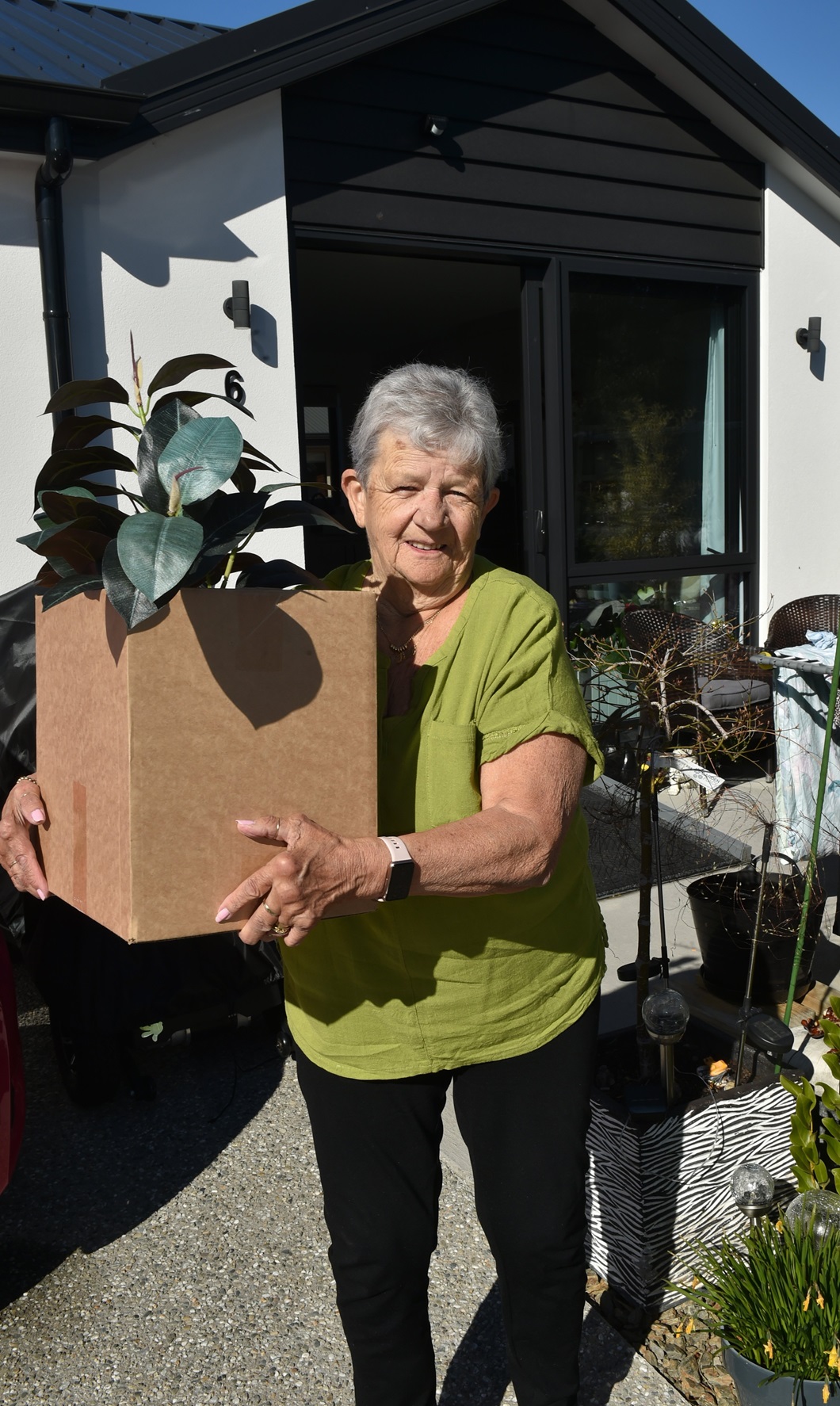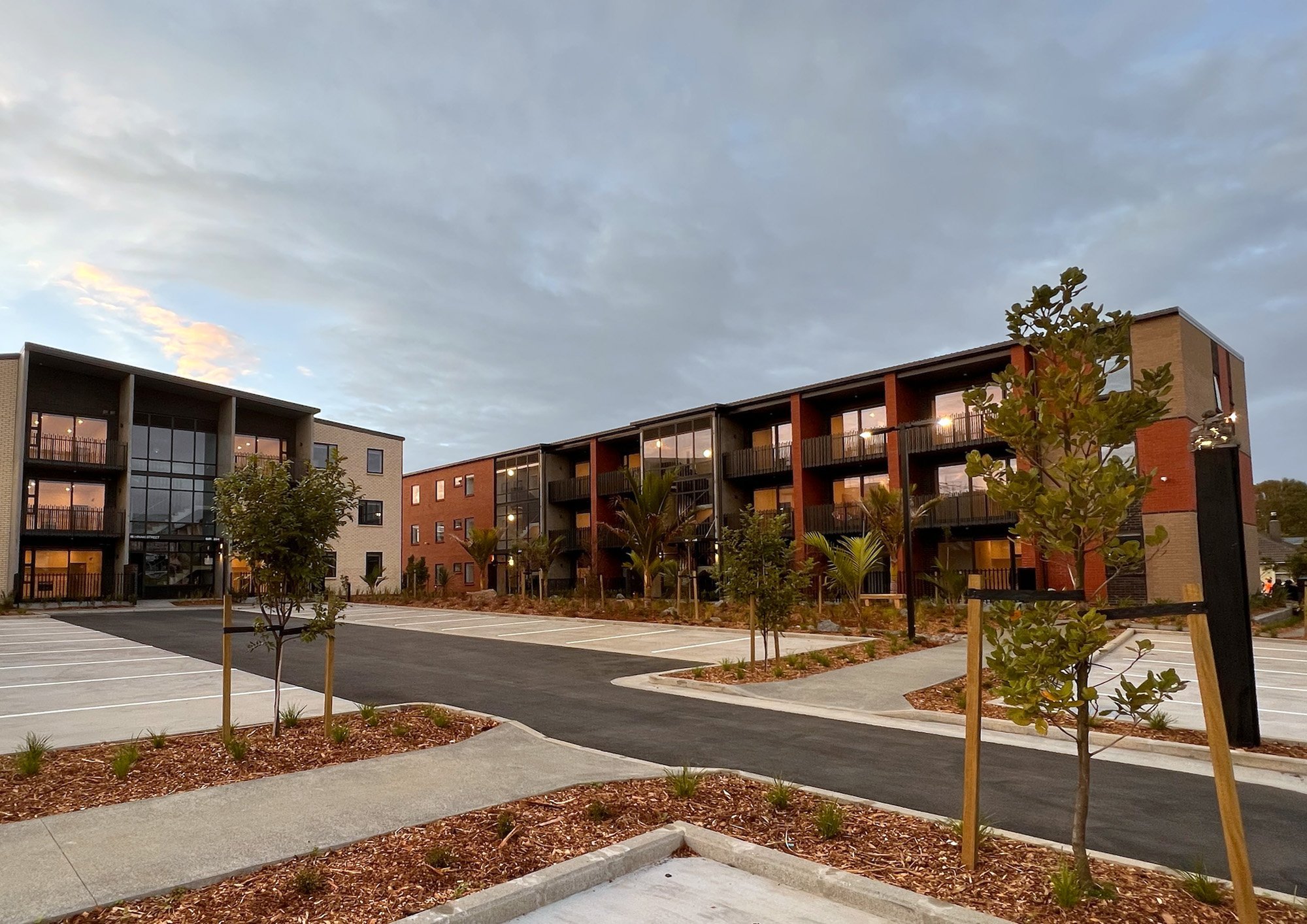
"Some days were as good as gold," Murray says. "Others were complete chaos.".
The Dunedin man is recalling the three months he and his wife spent sorting through their belongings before donating many of them and moving from a large, two-storey home to a two-bedroom townhouse in February.
"It was stressful. I don’t think I’ve ever gone to work so tired in my life."
Murray, who does not want his full name used, is among the many seniors each year who trade their large family home for a smaller property.
For most, this means less upkeep, lower bills and more time to do the things they enjoy. It can also free up cash for hobbies and holidays, paying off debt or building an emergency fund for unforeseen expenses.
For many older Kiwis, a suitable property means one that is close to amenities such as shops and public transport.
Property adviser Peter Gale says they also want it to be single level — or double storey with a lift — modern, low maintenance, sunny, warm and on a compact, easily-managed flat section. Ideally, it will have a good-sized garage and two bedrooms, plus a "study" that can be used as storage or a spare bedroom. However, properties that tick all or most of those boxes are few and far between.
"Some developers are working hard to meet this need, but Dunedin, as a harbourside city surrounded by hills, is running out of cost-effective development land."
"Even further afield, at Mosgiel, there’s limited infrastructure to support additional significant development."

Selling an older family home to buy a smaller townhouse might be more like a straight swap than a way to free up cash; it could even require a top-up.
Judd de la Roche, Dunedin ambassador for the Real Estate Institute of New Zealand (REINZ), says most people hope to be left with $50,000 to $100,000 in the bank and that’s "not impossible".
"If you look at the average house being around $600,000, they can sell that and buy a single bedroom unit for about $420,000 to $450,000. However, that’s a very small unit, generally about 45sq m to 50sq m — workable for a couple but ideal for a single person."
Mr de la Roche’s partner, Carol Williamson, has sold real estate in Mosgiel for 34 years. She says the price of a two-bedroom unit is typically in the mid $500,000s to $600,000s; but up to $800,000 if it has a second bathroom and a single garage. Because this is out of reach for many people, fewer two-bedroom units are being built.
While she has sympathy for buyers, cost increases mean developers can no longer afford to buy a section and build only two units on it, she says.
"Obviously there’s a greater return for developers in one-bedrooms and they’re getting more of them on to sections."
Some retirees are willing to do without a second bedroom and a garage so they can have money in the bank and travel when they want to, she adds.
"They make it work, because it gives them a lifestyle."
Still, many are having to make choices they did not have to in the past.

"What won’t they compromise on?"
What is clear is that throughout the country, there’s a mismatch between the type of homes older people need, and what is available.
Except for retirement villages, the stock of smaller, affordable homes — particularly accessible housing with features such as level entries and wider doorways — is limited.
According to the Retirement Commission, three-bedroom family homes or newer multi-level terrace housing will not cater for the changing demands of an older population and there needs to be new ways to stimulate the supply of "affordable and accessible accommodation options" for older people.
Mr de la Roche says downsizing might mean moving to an older home on a smaller section, or a family combining their money to buy a house that has space downstairs or a secondary building for the older generation: "There are a lot of properties which have had airbnbs and when these re-sell, you’ve got a separate accommodation area that can be used for multi-generational living".
Mr Gale says by necessity, the few new builds in established suburbs handy to the city tend to be multi-unit projects.
"While the cost of a suitable cleared site is significant, that’s just the start. The increasingly onerous regulatory environment and building code requirements around things such as site preparation and engineering impose massive additional costs that many do not appreciate. The compliance behemoth means that even vastly experienced developers struggle to make the numbers work at an acceptable level."
All of this also raises concerns about whether there will be enough suitable housing for the growing number of people going into retirement as renters.
In the next few decades, the number of older Kiwis who are renting or still paying mortgages will increase significantly. One in four people aged between 50 and 65 don’t own the home they live in and by 2048, 40% of people aged 65 and over — or up to 600,000 people — will be renting, according to the Retirement Commission.

One company hoping to improve housing security for retirees and others is Simplicity Living, which is linked to Simplicity, the not-for-profit KiwiSaver manager.
Recently, it announced plans to build up to 600 high-quality homes for long-term rent in Queenstown.
The $500 million project is the company’s first development outside Auckland, where it has built 210 apartments and has another 889 under construction. Within the next few years, it hopes to be building 1000 a year.
Simplicity managing director Sam Stubbs says there is a "massive shortage" of one- and two-bedroom apartments throughout New Zealand and that’s why they make up the vast majority of the company’s builds. In order to reach the average for a similar country in the OECD, New Zealand would have to build 166,000 of them: "It’s an awful lot".
The shortage is partly due to smaller apartments being in demand from many groups, including retirees, people who have separated and those who choose to be single, he says.
"And on the supply side, the New Zealand dream has always been a standalone three- or four-bedroom house so that’s what we’ve tended to build over the last 200 years."
While the company’s apartments are not specifically for older people, its oldest tenant in Auckland is 82 and Mr Stubbs expects there will be some retirees in the Queenstown complex, which is aimed at workers and permanent residents.
It is also looking at the possibility of selling some apartments to retirees and first-home buyers in the future.
Every tenant is offered a 10-year rental contract and the company would be happy for them to stay put for the rest of their lives if they want to, he says, adding that the thought of having to move house at 70 or 75 must be "terrifying".

"Most importantly, you get roofs over the heads of retirees, who are some of the most vulnerable people in the country."
With New Zealand Superannuation covering only basic needs, many Kiwis view the equity held in a house as their retirement strategy.
But Enable Me financial adviser Katie Wesney says larger family homes often sell for less than expected while retirement-friendly homes are in high demand and command premium prices.
There is another problem with having an over-reliance on bricks and mortar, she adds.
"There’s a major opportunity cost of just holding a singular home, in that equity sits idle for years when it could be growing elsewhere."
Transaction costs on the sale of a home typically consume 5% to 8% of value and if homeowners still have a mortgage on their property, this further reduces proceeds.
Add in the fact that many retirees immediately spend on holidays, cars or other big-ticket items without considering the long-term implications and "it’s a perfect storm of financial disappointment".
In fact, a survey of 2200 New Zealanders by the Financial Services Council found home-sale proceeds lasted just 3.3 years in retirement, not the decades needed.
While moving to a cheaper neighbourhood or town might help, Mrs Wesney says it is not the silver bullet many hope for. The financial benefits have to be weighed against access to healthcare and the distance from family and friends.

Reverse mortgages are not always the solution either. She says they work in specific situations, but compound interest can erode wealth quickly and professional advice is essential.
Mr Gale notes family homes are needed for the next generation of first-home buyers and families, and if downsizers do not move, this creates a supply bottleneck.
But many empty nesters do not plan to downsize at all, preferring to stay in a neighbourhood where they have friends and support networks, and in a house that is big enough to accommodate hobbies and visiting family members.
Data from Australian Seniors illustrates this situation. It found nearly 80% of older South Australians whose children were no longer at home had no plans to downsize. Strong emotional ties to the family home and an aversion to seeing it knocked down or redeveloped were significant barriers, many also noting there was a lack of suitable alternatives.
For those who do intend to move to a smaller property, the experts say it is best to start planning early. The ideal time to make big decisions is not after a health crisis or the death of a partner.
According to Mr de la Roche, downsizers often wish they had moved earlier but their belongings — or those left behind by adult children — have become "a road block".
Mel Thorp, of Estate of Grace — a company that helps clients to downsize — says people shifting from a three-bedroom house to a one- or two-bedroom unit typically end up getting rid of at least 70% of their belongings, and often another 5% after they have moved in.
Older people in particular find decluttering difficult because every item has memories attached to it, she says. However, it becomes easier once they get used to the process and if they know the items will be used by others, such as community groups and charities.
"We encourage people to remember why they’re downsizing ... Everybody does it because their house is too big and they don’t need all their stuff. It’s reminding them of the positives [associated with the move] ... We don’t encourage people to get rid of everything, but to be really conscious of what they do take."

"If it’s something you expect you’re going to have to do, just start doing it — even if it’s one drawer, one cupboard or one pile of papers."
Mrs Wesney feels the optimal time to downsize is when people are financially ready, but still energetic enough to manage the transition. For many of her clients, this is in their early 60s.
"If you do it too late, you will have fewer options to address your retirement shortfall. If you go too early, your home is too small for kids and grandkids."
First, people need to understand their best- and worst-case scenarios, she adds.
"Importantly, make downsizing one element of a broader retirement strategy; not your only solution ..."
"Start by accurately calculating your retirement needs. If you don’t know what your target is, it’s impossible to know if you are on track. Focus on eliminating mortgage debt while simultaneously building investments outside of your family home. For younger people, consider investment properties or co-ownership to get on the property ladder ..."
Mr Gale says buying a new home off the plans can work for the many downsizers who don’t know how or when to start the process, giving them time to declutter the family home and do any work required to maximise its sale price.
Whichever option they choose, he recommends people do their research — which could involve visiting retirement villages, attending workshops or viewing show homes — seek the help of their accountant, lawyer and family members, get a property appraisal so they know what their house is likely to sell for, and have an open mind.
"Sometimes your ideal property just doesn’t exist at the price you’re prepared to pay so be open to compromises. Understand your options well in advance of your move."

"I’d always wanted three bedrooms, but this is two bedrooms and it seems to be enough. And there’s no stairs so that’s fantastic."
The 64-year-old, who still works full-time, would have liked to have stayed "on the hill" in Waverley, but there were no suitable properties with flat sections.
While they were "probably not quite ready to leave" their home of 30 years, an old foot injury made it difficult for him to climb stairs.
"We were thinking to the future. If you don’t start planning beforehand, then I think you get into trouble."
While he misses some aspects of his former home, he has no regrets about downsizing. The townhouse is warm, low maintenance and close to a bus stop and shops: "I think we’ve made the right move."
His advice to others in a similar position is to shift sooner rather than later.
Rental retirement
• Around one in four people aged between 50 and 65 don’t own the home they live in (2018 Census).
• By 2048, 40% of people aged 65 and over — or up to 600,000 people — will be renting (according to the Retirement Commission).

"I just love it here ... It’s everything I need."
After being widowed 20 years ago, Mrs Crichton stayed in the family home for 10 years but maintaining the large section, while her own health was "not 100%", prompted her to downsize to a two-bedroom unit.
"The biggest mistake was that it had stairs," she says, explaining why she moved again nearly a year ago.
While selling the family home left her enough money to put in a new kitchen and travel to the UK, moving from the two-bedroom unit to the one-bedroom townhouse was more like a straight swap financially.
The 48sq m townhouse is one of nine on what was previously a large section with one house.
"People say it’s a shame pulling these old houses down. But would you sooner have an old house and be cold, or a new house and be warm?" the retired cook says.
"I like the way it lies to the sun ... I’ve also got more friends since I’ve been here.
"I’m central and people pop in all the time."
Her advice for others who might be thinking about downsizing is entirely unequivocal.
"Take the bull by the horns and go for it, like I did."













